ICMI Newsletter - September 2025
Jean-Luc Dorier (ICMI Secretary-General)
Jinfa Cai (ICMI Vice President)
Lena Koch (ICMI Administrative Manager)
Publishing dates:
March 15, June 15, September 15, December 15
Editorial
Editorial – From the desk of Jinfa Cai, ICMI Vice-President (2025-2028), University Of Delaware, USA. Working Together to Improve the Impact of Research on Practice
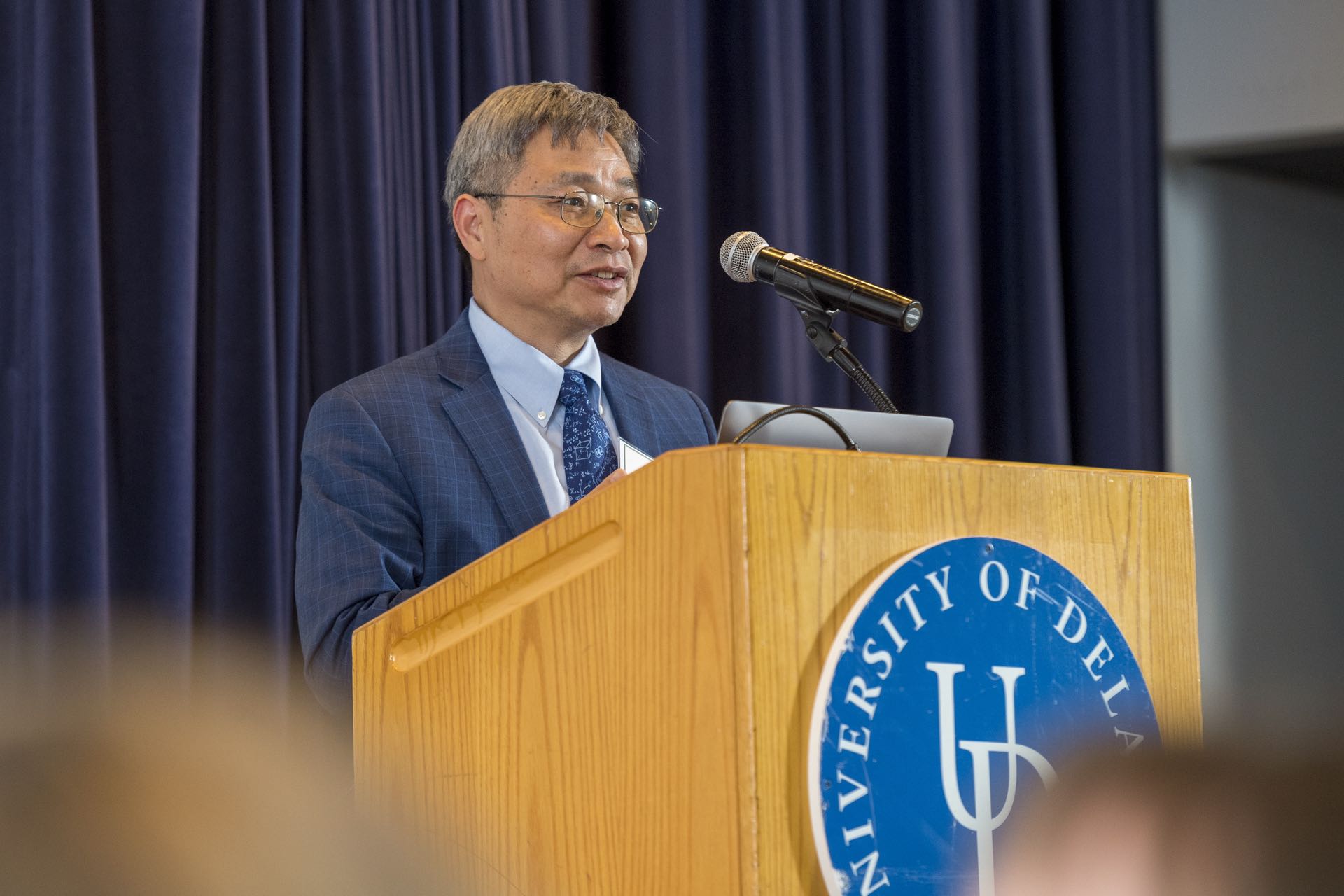 When I was serving as the editor-in-chief for the Journal for Research in Mathematics Education (JRME), one of our foci was to increase the impact of research on practice. Our very first editorial addressed improving the impact of research on practice (Cai et al., 2017b). This is not a new idea. In fact, journals such as JRME and Educational Studies in Mathematics (ESM) were established to address the impact of research on mathematics classroom instruction. JRME was launched in 1970 by the National Council of Teachers of Mathematics as a venue for systematic, rigorous research aimed at improving mathematics teaching (Cai et al., 2017b). At the time, authors were encouraged to publish companion pieces in teacher-oriented journals, such as The Mathematics Teacher, to enhance research accessibility. Though this formal connection has since diminished, JRME has remained committed to the foundational goal of linking research and practice.
When I was serving as the editor-in-chief for the Journal for Research in Mathematics Education (JRME), one of our foci was to increase the impact of research on practice. Our very first editorial addressed improving the impact of research on practice (Cai et al., 2017b). This is not a new idea. In fact, journals such as JRME and Educational Studies in Mathematics (ESM) were established to address the impact of research on mathematics classroom instruction. JRME was launched in 1970 by the National Council of Teachers of Mathematics as a venue for systematic, rigorous research aimed at improving mathematics teaching (Cai et al., 2017b). At the time, authors were encouraged to publish companion pieces in teacher-oriented journals, such as The Mathematics Teacher, to enhance research accessibility. Though this formal connection has since diminished, JRME has remained committed to the foundational goal of linking research and practice.
I began writing this editorial after I had just attended the PME-48 conference in Santiago, Chile, which focused on transforming research into practice. Researchers from many countries discussed issues related to addressing the divide between research and practice. I was very honored to be invited to deliver the opening plenary for PME-48. The focus was on problem posing, and I used the Problem-Posing-Based Learning (P-PBL) instructional model to organize the progress and potential of problem-posing research (Cai, 2025). In the beginning of my plenary, I described the reasons for my choice of that model to organize my plenary, all of which stem from the practical aspects of the P-PBL model. Through this PME-48 conference, I saw that the divide between research and practice needs to be continually addressed given that we continue to face many challenges.
I am very honored to serve as vice president of ICMI. In this editorial, I want to use this opportunity to highlight this issue of linking research with practice. I am very encouraged by collaboration among scholars around the globe. In the remainder of my editorial for this newsletter, I would like to suggest three particular potentially fruitful strategies to address the challenges of linking research with practice.
First, we need to be strategic and accumulate the knowledge gained from past efforts made to link research and practice. Silver and Lunsford (2017) provided a historical overview of the research-practice gap and conceptualized how to address this gap. One of their suggestions was to cross the research-practice border (i.e., bidirectional passage across a boundary). Indeed, perhaps there is a two-way street between theory for teaching and teaching for theory (Cai et al., 2023).
Second, we need international dialogue to document the effective cases in which research has truly reached the classroom. In describing such cases, we should identify under what conditions certain things worked and why they worked based on the research. This could result in such cases of successful linking of research and practice which could be adopted elsewhere. I was very encouraged that at the PME-48 conference the first person to ask me a question at the end of my opening plenary was a doctoral student who was eager to make contributions and connections to the international research community in mathematics education. Thus, the goal of collaboration is not only to continue to identify those successful cases that effectively link research and practice but also to continue to work together to nurture the young generation of scholars in mathematics education. I met at least 15 doctoral students on a variety of occasions during PME-48. In recent years, the ICME and PME conferences have typically provided early research days for young scholars. These are wonderful opportunities to nurture the young generation of scholars.
Third, we require collaboration between researchers and teachers. To address the research-practice gap, we need to hear teachers’ voices. In fact, we not only need to establish teacher-researcher partnerships but also make classroom implementation an integral part of research (Cai et al., 2017a). In the current P-PBL research project, teachers are truly partners in developing problem-posing tasks, implementing P-PBL in the classroom, and developing P-PBL teaching cases (Cai, 2025).
In summary, we need to reexamine this mission of improving the impact of research on practice, acknowledging the historical roots of an international mathematics education community such as ICMI, while calling for renewed strategies to increase its practical impact. I am looking forward to working with all scholars around the globe under the auspice of ICMI to improve the impact of research on practice.
References
- Cai, J. (2025). Mathematical problem posing: Progress and potential. In C. Cornejo, P. Felmer, D. M. Gómez, P. Dartnell, P. Araya, A. Peri, & V. Randolph (Eds.), Proceedings of the 48th Conference of the International Group for the Psychology of Mathematics Education: General contributions (pp. 29-54). International Group for the Psychology of Mathematics Education.
- Cai, J., Morris, A., Hohensee, C., Hwang, S., Robison, V., & Hiebert, J. (2017a). Making classroom implementation an integral part of research. Journal for Research in Mathematics Education, 48(4), 342-347.
- Cai, J., Morris, A. B., Hwang, S., Hohensee, C., Robison, V., & Hiebert, J. (2017b). Improving the impact of educational research. Journal for Research in Mathematics Education, 48(1), 2–6. https://doi.org/10.5951/jresematheduc.48.1.0002
- Cai, J., Hwang, S., Melville, M., & Robison, V. (2023). Theory for teaching and teaching for theory: Artifacts as tangible entities for storing and improving professional knowledge for teaching. In A. K. Praetorius & C. Y. Charalambous (Eds.), Theorizing teaching (pp. 225-251). Springer.
- Silver, E. & Lunsford, C. (2017). Linking research and practice in mathematics education: Perspectives and pathways. In J. Cai (Ed.), Compendium for research in mathematics education (pp. 28-47). National Council of Teachers of Mathematics.
Call for 2028 ICMI Awards
Call for the 2028 ICMI Awards:
- Felix Klein Award for lifelong achievement in mathematics education research
- Hans Freudenthal Award for a major program of research on mathematics education
- Emma Castelnuovo Award for outstanding achievements in the practice of mathematics education
Deadline for nominations for the three Awards is: November 30, 2026.
Call for intention to bid to organize and host ICME-17 in 2032
Call for intention to bid to organize and host ICME-17 in 2032
ICME is the largest international conference on mathematics education. It is held every leap year and it is the meeting point for mathematics educators, curriculum developers, mathematicians, researchers in mathematics education, teachers, teacher educators, and resource producers.
The three ICMI Awards to recognize outstanding achievement in mathematics education are presented at the ICME Opening Ceremony. The Felix Klein Award and Hans Freudenthal Award were established in 2000 and first presented in 2003. While the Felix Klein Award honors lifetime achievement in mathematics education research, the Hans Freudenthal Award instead recognizes a major cumulative program of research. The Emma Castelnuovo Award, first presented in 2016, acknowledges outstanding achievements in the practice of mathematics education.
On the day before the ICME Opening Ceremony, the ICMI hosts a one-day meeting of its General Assembly (GA). Recent ICMEs have also featured a separate Early Researcher Day, usually held before the Congress begins.
ICMI is hereby inviting the ICMI community (ICMI country representatives, national/regional mathematics education and mathematics organizations, and academic institutions) to consider the possibility of organizing and hosting the International Congress on Mathematical Education in July/August 2032.
Please note: Applications by convention centers, tourist agencies, or any other commercial organization will not be considered.
ICMI AMOR
News from ICMI Awardees Multimedia Online Resources Project
This project aims at building online resources reflecting highly significant and influential research in mathematics education at an international level that could serve as a reference not only for researchers in the field but also for educators, teachers, curriculum developers, and policy makers and other agents in the field. In particular, the project could serve as a basis for a PhD training program and induction into mathematics education research.
A quick glance of the videos in the units of the project can be seen here.
Fliers are available here:
Flyer
Poster (vertical)
Poster (horizontal)
Moreover, we have made a YouTube channel that is more accessible with new functionalities.
At the moment, the automatic translations in different languages offered by YouTube are not always very accurate but, with the advisory board, we are working on making them better.
Out of 24 awardees, 7 units are completed and several are in progress.
Country Context
Updates on Short Descriptions of the Mathematics Education Context in Different Countries
As announced in the last newsletter, when reshaping its website, ICMI EC decided to replace the database project with a wider presentation of the context of mathematics education in every ICMI country according to the following 5 sections:
- Associations for Mathematics Education
- Research Institutions for Mathematics Education Research
- Journals for Mathematics Education Research
- Mathematics Teacher Education
- National Syllabus and Standard
At the moment, the information is accessible for the following countries: Australia, Bangladesh, Czech Republic, Finland, France, Germany, India, Italy, Malawi, and Switzerland. For the countries, please go here.
We hope that this list will grow rapidly!
Updates from ICME-16
Updates from ICME-16
David Janda, ICME-16 Co-Chair of LOC
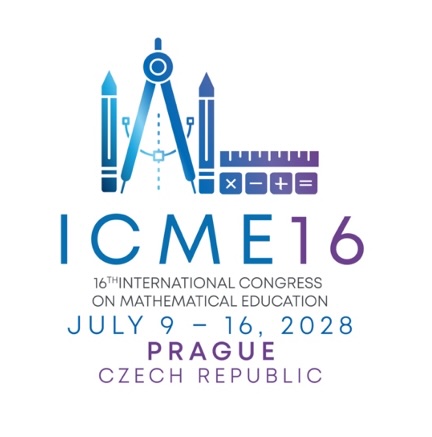
Dear colleagues and friends in mathematics education,
As a co-chair of the Local Organizing Committee for ICME-16 (Prague, July 9–16, 2028), it is my pleasure to bring you news of ICME-16 preparations.
The LOC has launched several planning meetings with Guarant International, our hosting agency, with the common goal of reaching out to the global community of mathematics educators and researchers, who we look forward to welcoming in Prague in 2028.
An important early step in this process is the first International Program Committee (IPC) meeting, scheduled for September 15–19, 2025 in Prague. We are now finalizing the materials for this meeting so that within just five days, the IPC can prepare a substantial part of the scientific program. During this meeting, IPC members from across the world will select plenary and invited speakers and Topic Study Group chairs and members as well as discuss other key components of the program. You can meet the members of the IPC on our website at https://www.icme16.org.
In the following months, we will reach out to potential plenary speakers and Topic Study Group leaders—and watch with anticipation whether they accept our invitation.
We are also coordinating with national and regional partners who are eager to contribute to the success of ICME-16. As part of our program, we are planning a Regional Focus programme to spotlight mathematics education in the Central and Eastern European context. These sessions will feature lectures, exhibitions, discussions, screenings, and guided walks.
We are well aware that the most important element for the success of the congress does not lie in Prague itself but in the participation of colleagues in mathematics education from all around the world.
By now, it almost seems that what remains to be resolved is just the arrangement of tables in the foyer. So why hesitate to come to Prague in 2028?
Show us your support and let us know if you intend to join us in Prague by signing up at https://www.icme16.org/interest-form to receive further updates.
ICMI Study 27
Update on ICMI Study 27 - An ICMI Study in Process: Notes from the Co-Chairs of ICMI Study 27 “Mathematics Education and the Socio-Ecological”
Kate le Roux and Alf Coles, Co-Chairs of ICMI Study 27
The ICMI Study 27 topic “Mathematics Education and the Socio-Ecological” is new relative to past ICMI Study topics. As Co-Chairs, we are deeply cognizant of the responsibility that comes with the task of realizing the growing body of work within this topic as a Study Volume. Throughout the Study process we have been challenged: What does it mean to be ‘learning’ and ‘coming to know’ the role of mathematics education in our current, but also future, socio-ecological world—within the practices and structures of an ICMI Study?
Since February 2025, Study participants have been crafting the Study Volume, with first drafts of chapters currently going into review. In this newsletter we share our emerging thoughts on addressing the above-mentioned challenge.
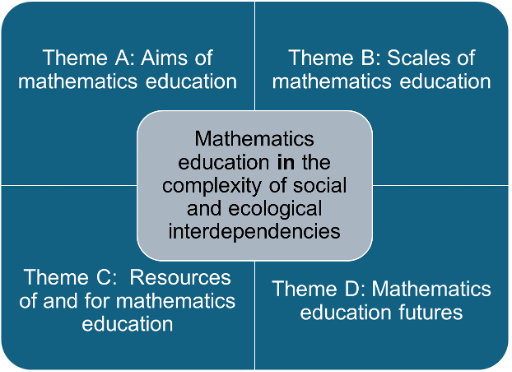 Firstly, as per the ICMI Study tradition, we chose to frame the Study direction around Themes. Each Theme prompts thinking with notions of the social and ecological and their interdependencies as well as considerations of tensions emerging from mathematics education positionings in these complex relations. Each Theme asks of mathematics education specific questions related to: knowledge, curriculum, pedagogy, learning materials, teacher education, language, philosophy, theory, methodology, and so on.
Firstly, as per the ICMI Study tradition, we chose to frame the Study direction around Themes. Each Theme prompts thinking with notions of the social and ecological and their interdependencies as well as considerations of tensions emerging from mathematics education positionings in these complex relations. Each Theme asks of mathematics education specific questions related to: knowledge, curriculum, pedagogy, learning materials, teacher education, language, philosophy, theory, methodology, and so on.
As Co-Chairs we are excited by how our understandings of and confidence in these Themes —working individually and together— as tools for thinking about the topic has grown, as they have been given meaning for use in: the Study Proceedings; Theme Working Group discussions, in conversation with Plenary activities, at the Study Conference; and now when crafting the Study Volume. These Themes thus form the central organizing principle of the Volume and will be introduced as a lens for reading the contributions, including the four Plenary papers. For each Theme, two or three International Program Committee (IPC) leads offer an Introduction. This gives voice to the existing knowledges of our communities around that Theme, synthesizes new insights from the Theme-specific chapters, and charts new ways of thinking and practicing for the future. Then, each of the Theme-specific chapters use and build on the rich discussions at the Study Conference.
Another experience we want to reflect on, at this time, is that learning and coming to know in a Study on “Mathematics Education and the Socio-Ecological” involves practices such as plurivocality, relationality, listening, talking, being silent, care, humility, ethics, sitting with uncertainty, critique, activism, and hope. The fifteen Chapter author teams each comprise three to seven authors from 21 countries on six continents. Each author brings particular knowledges and practices to the relations, which have involved writing and meeting regularly to think and talk. In our experience, not only does our writing and knowledge production enact the practices listed above, but these are practices that we notice are running through arguments within the Volume itself. Yet the presence of these practices raises additional questions about learning and coming to know in relation in Study 27: How do we fully represent these knowings and practices when publishing solely in English? How do we recognize our relations in linearly ordered citation practices?
Our current review process involves each Chapter receiving three readings from two Study Volume authors and one reader who has not participated in the Study. This is another important part of our collaborative learnings contributing towards our goal of publishing the ICMI Study 27 Volume during 2026.
News from Affiliate Organizations
ADiMA-5
First Announcement of the 5th Conference of the African Association for Mathematics Didactic (ADiMA-5)
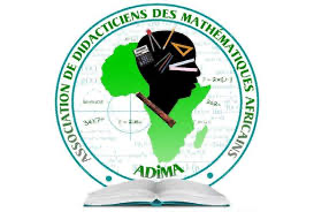 African Association for Mathematics Didactic (ADiMA) proudly announces the launch of the 5th ADiMA Conference (ADiMA-5)
African Association for Mathematics Didactic (ADiMA) proudly announces the launch of the 5th ADiMA Conference (ADiMA-5)
Dates: December 14–18, 2026 | Location: Niamey, Niger
Theme: Teaching Mathematics in Today’s Africa: Between Issues, Challenges, Innovations, and Commitments for the Future
ADiMA-5 aims to explore mathematics education in Africa by addressing current challenges, innovative approaches, and future commitments. Drawing on research in mathematics didactics, the conference will highlight teaching practices, obstacles, innovations, and African-specific perspectives.
Key questions include:
- How can teacher training reflect the diversity of African contexts?
- Which didactic localized innovations can make mathematics teaching more equitable and relevant?
- How to integrate digital technologies and AI critically into practice teaching?
- How does multilingualism affect concept understanding, and what pedagogical responses are effective?
- How to design curricula that balance scientific rigor, social relevance, and cultural grounding?
- What educational measures can reduce inequalities while respecting linguistic and political specificities?
Structure:
The conference is organized around six working groups (WG):
1. Teaching practices and initial and continuing teacher training devices
2. Different forms of mathematical thinking
3. Mathematics teaching in the digital & AI era
4. Mathematics teaching in special contexts
5. Postsecondary mathematics teaching
6. Language, historical, & cultural dimensions in the teaching and learning of mathematics
The ADiMA executive board, the ADiMA5 scientific committee, and the local organizing committee are working to ensure the success of this international scientific event.
Save the dates: December 14–18, 2026.
Website in progress.
For more information, contact:
CIEAEM
News from CIEAEM (The International Commission for the Study and Improvement of Mathematics Teaching) - CIEAEM 76: Webinar Series during Fall 2025
Cristina Sabena, President of CIEAEM
Lisa Björklund Boistrup, Secretary of CIEAEM
As informed earlier, CIEAEM 76 will take the form of three online seminars during the fall of 2025, in which all interested are welcome to participate. These webinars will take place on the following dates: October 3, 2025; November 14, 2025; December 5, 2025.
The webinars are scheduled from 4 to 6 PM, CET time. During the seminars, there will be presentations, discussions, and so on.
During the first webinar, October 3, 2025, on Zoom, the overarching theme for these webinars will be addressed. This overarching theme, “How can mathematics education curriculum anticipate and prepare for a changing world?” will inform all three webinars.
Speaker introducing the overarching theme: Professor David Wagner, University of New Brunswick, Canada
The main focus of the first webinar is the subtheme “Technologies and Challenges,” which may concern topics such as affordances of technology-based pedagogies and curricular innovations; new mathematical content emerging in technology-based pedagogies; and how social media may be incorporated into curricular modules that collect important data, create mathematical models, challenge traditional forms of problem solving, and powerfully engage learners and their communities in important mathematics learning.
Speakers/Discussants for the subtheme:
Professor Nathalie Sinclair, Simon Fraser University, Canada, and Professor Chronis Kynigos, National and Kapodistrian University of Athens
Organisers: Gilles Aldon, Andreas Moutsios-Rentzos, Cristina Sabena
Zoom link for the webinar on October 3: Here.
Meeting ID: 992 1863 5872 Passcode: 700723
For more detailed information about the themes, please consult the Second Announcement of CIEAEM 76:
For questions or further information, please contact:
ICTMA
News from ICTMA
Vince Geiger, President of ICTMA
The 22nd International Conference on the Teaching of Mathematical Modelling and Applications (ICTMA22) was held in the beautiful city of Linkoping, Sweden from August 11-15, 2025. The success of the conference, which was both a scholarly and joyful event, was due to the contributions of participants. It was so wonderfully led by the co-convenors, Professor Jonas Arlback and Associate Professor Peter Frejd. Thanks is also due to the local organizing team who supported the conference above and beyond.
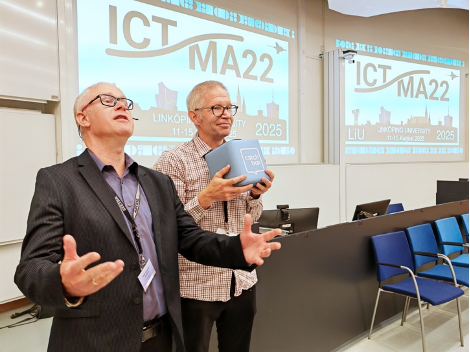
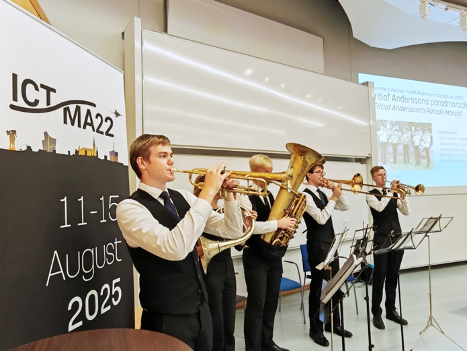
The conference attracted over 170 participants from 31 nations. Highlights of the conference included a keynote address by Professor Gabriel Kaiser and plenary presentations from Professor Kimmo Ericsson (Mälardalen University College, Sweden), Professor Daniel Orey (Federal University of Ouro Preto, Brazil), Associate Professor Serife Sevinc (Middle East Technical University, Turkey; T.U. Dresden, Germany), Dr. Kerri Spooner (Auckland University of Technology, New Zealand) and Associate Professor Takashi Kawakami (Utsunomiya University, Japan). The conference concluded with a plenary panel discussion on the role of mathematical modelling in responsible and critical citizenship led by Professor Pauline Vos (Western Norway University of Applied Sciences, Norway) with panelists Professor Marcelo C. Borba (State University of São Paulo, Brazil), Professor Vince Geiger (Australian Catholic University, Australia), and Associate Professor Britta Eyrich Jessen (University of Copenhagen, Denmark).
The next ICTMA conference will be held in Kruger National Park, South Africa from August 22-27, 2027.
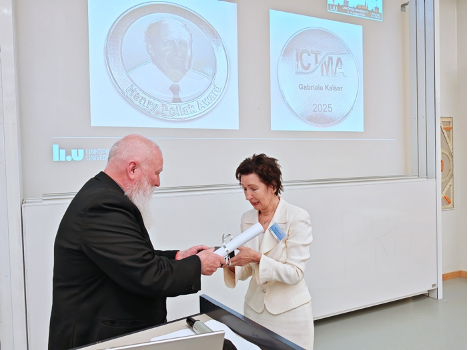 Henry Pollak Award 2025 for Gabriele Kaiser
Henry Pollak Award 2025 for Gabriele Kaiser
The Henry Pollak Award, the ICTMA medal for lifetime research in mathematical modelling, was first presented in 2021. It honors internationally distinguished scholars for long-term, high-impact contributions to research. Previous recipients include Werner Blum (Germany), Peter Galbraith (Australia), Mogens Niss (Denmark), and Gloria Ann Stillman (Australia). ICTMA President Vince Geiger presented Gabriele with the Henry Pollak Award at the ICTMA conference in Linkoping, Sweden during August 2025 and was acknowledged by those in attendance via a standing ovation.
Gabriele Kaiser has built an exceptional international career in mathematics education. Gabriele has been a professor at the University of Hamburg since 1998. Her research spans teacher education, mathematical modelling and applications in school classrooms, international comparative studies, and gender and cultural perspectives in mathematics education.
Gabriele’s many achievements include: Editor-in-Chief of ZDM Mathematics Education (2005–2024), convenor of ICME-13 in Hamburg 2016, two terms as ICTMA President (2007-201; 2019-2023), and continuing Editor of the book which captures discussion from ICTMA conferences as part of the series International Perspectives on the Teaching and Learning of Mathematical Modelling (since 2017).
Gabrieles’s research has international impact on the field, particularly in the areas of including competence models, perspectives on modelling, and studies on teacher beliefs.
MCG
News from the international group for Mathematical Creativity and Giftedness (MCG)
Elisabet Mellroth, President of MCG
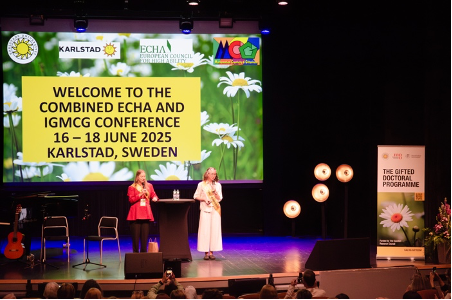 From June 16 – 18, the 14th MCG conference was held in Karlstad, Sweden. It was a joint conference together with the larger organization European Council for High Ability (ECHA). The organizers were Karlstad University in collaboration with the City of Karlstad; the chairs were Elisabet Mellroth and Valerie Margrain, both of Karlstad University.
From June 16 – 18, the 14th MCG conference was held in Karlstad, Sweden. It was a joint conference together with the larger organization European Council for High Ability (ECHA). The organizers were Karlstad University in collaboration with the City of Karlstad; the chairs were Elisabet Mellroth and Valerie Margrain, both of Karlstad University.
Of the around 200 participants, 70 specifically came for the MCG part. We had around 140 presentations of different kinds; symposia; lectures; workshops; poster presentations; and, of course, Keynotes. Approximately 35 presentations were MCG presentations but many of the ECHA presentations were about mathematics and highly able students too.
You can read about the content from the MCG part of the conference in the published proceeding, free available online. I especially encourage you to read the paper from our Keynote in mathematics education, Professor Jorryt van Bommel. Her keynote was highly appreciated.
One quote from the evaluation illustrates how engaging her talk was:
Jorryt van Brommel´s keynote was truly inspiring! If I have had a math teacher like her I might have liked mathematics (from an ECHA participant)
Download the full proceedings through this link.
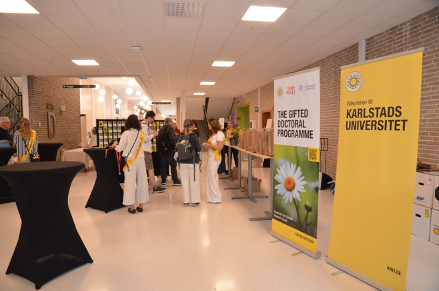 The joint conference received overwhelmingly positive feedback. Most participants praised the event’s organization, inspiring content, and welcoming atmosphere. The venue at Sundsta-Älvkullegymnasiet was highly appreciated, with 91% rating it positively, and the conference's structure—including fika (coffee and tea) breaks and social events—was noted for fostering meaningful networking opportunities. Keynotes and parallel sessions were generally well-received, though some attendees suggested improvements in content alignment.
The joint conference received overwhelmingly positive feedback. Most participants praised the event’s organization, inspiring content, and welcoming atmosphere. The venue at Sundsta-Älvkullegymnasiet was highly appreciated, with 91% rating it positively, and the conference's structure—including fika (coffee and tea) breaks and social events—was noted for fostering meaningful networking opportunities. Keynotes and parallel sessions were generally well-received, though some attendees suggested improvements in content alignment.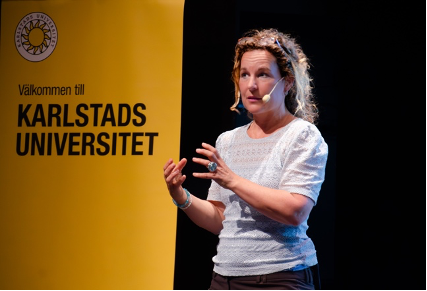
Participants valued the opportunity to gain new knowledge and contacts, with 90% agreeing that the conference contributed positively to their professional work. The vegetarian food offerings were highly praised for quality and inclusivity. Overall, the conference was described as a well-executed, enriching experience that exceeded expectations for many attendees.
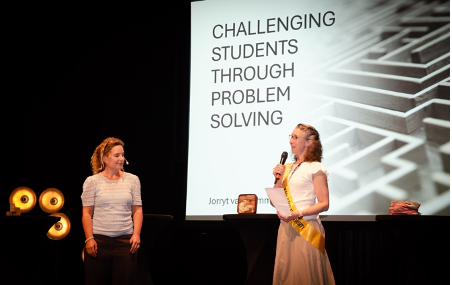 To read more about the conference visit the conference website, which will be updated with some nice pictures.
To read more about the conference visit the conference website, which will be updated with some nice pictures.
The 15th MCG conference will be held in Canada in September 2027.
Keep an eye on the MCG website for more information: www.igmcg.org
For questions or further information, please contact Elisabet Mellroth through .
MERGA
MERGA47 2025 Conference Report
The 47th Mathematics Education Research Group of Australasia (MERGA47) conference was successfully held from July 6-10, 2025, in Canberra. The conference was hosted by the University of Canberra, chaired by Associate Professor Tracy Logan, with the opening of the conference held at the iconic Shine Dome, the home of the Australian Academy of Science. The conference theme was “Unlocking Minds in Mathematics Education” and proved a stimulating focus for the week’s keynote presentations and other activities.
The conference proceedings, edited by Associate Professor Sitti Maesuri Patahuddin, Dr. Lorraine Gaunt, Dr. Danielle Harris, & Dr. Kristen Tripet, contains some 82 fully refereed keynote and full presentation papers, short presentation abstracts, symposia, and round table papers and is available from the MERGA webpage for interested readers.
A highlight of the week was the awarding of two life memberships to longstanding MERGA colleagues who have both contributed so much to our community over a sustained period. The awards were both received with standing ovations by all members (Figure 1).
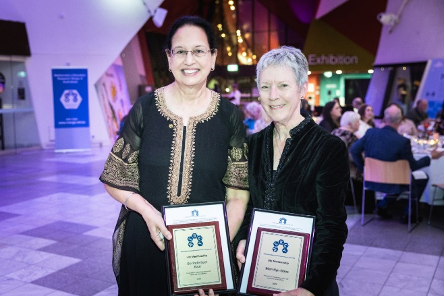 Figure 1 Professor Berinderjeet Kaur and Professor Merrilyn Goos, recipients of Life Membership awards from MERGA, presented at the conference dinner.
Figure 1 Professor Berinderjeet Kaur and Professor Merrilyn Goos, recipients of Life Membership awards from MERGA, presented at the conference dinner.
This year’s conference attracted an international audience, with delegates from 12 countries including Australia, Germany, Indonesia, Japan, Mauritius, New Zealand, Norway, Papua New Guinea, Singapore, South Africa, the United Arab Emirates, and the United States of America. The diverse participation underscored the global interest in the MERGA community for advancing mathematics education research and practice.
Two keynote presentations effectively addressed and set up the conference theme. Professor Susanne Prediger from TU Dortmund University (Germany) delivered the opening keynote titled “Unlocking Minds by Conceptually Focused, Student-Centred Explicit Mathematics Teaching and Quantitative Evidence for Effectiveness” from the perspective of students, teachers, researchers, and policy makers. The second keynote was presented by Professor Bethany Rittle-Johnson from Vanderbilt University (Nashville, USA) titled “Comparing and Discussing Multiple Strategies to Promote Learning in Mathematics Classrooms,” illustrating how cognitive science research can guide the design of effective educational materials as well as challenges that occur when bridging from cognitive science research to classroom instruction.
The Clements-Foyster lecture was presented by Professor Catherine Attard from the School of Education at Western Sydney University. The Clements-Foyster Lecture is an annual award established in honor of the two founding members of MERGA in 1976/1977, Professor Ken Clements and John Foyster. Her lecture “Unlocking Minds: Exploring the Pendulum of Mathematics Pedagogy” drew on voices from previous Clements-Foyster lectures and used the lens of her own experiences to explore the current pedagogy debate in mathematics education.
The Beth Southwell Practical Implications Award, which recognizes studies that bridge research and practice, was won by Dr. Jiqing, with a presentation entitled “Exploring the Complexity of Students’ Inconsistent Relational Understanding of the Equal Sign.” Dinah-Marie Wiedenhöfer from the University of Education Schwäbisch Gmünd (Germany) was the winner of the Early Career Award, which recognizes emerging talent in the field, with a presentation entitled “Promoting Financial Numeracy through Mathematics Education.”
Other highlights were the special pre-conference workshop Balance vs Blended: Developing a Fulfilling Career in Academia delivered by Professor Janette Bobis and Professor Merrilyn Goos on the Sunday preceding the MERGA Newcomer’s Welcome; the now regular Teacher’s Day event, with some 15 teachers attending the Beth Southwell Practical Implications Award presentation; and other classroom-focused presentations specially scheduled in the program.
The MERGA47 conference successfully brought together diverse perspectives and approaches in mathematics education, providing a platform for rich learning experiences and collaborative opportunities. By bridging research and practice, the conference contributed significantly to advancing the field of mathematics education and unlocking minds in Australasia and beyond.
Next year’s MERGA48 conference will be held from July 6-10, 2026 in Sydney, hosted by Western Sydney University and chaired by Professor Catherine Attard.
PME 48
Thoughts in the aftermath of PME 48 in Santiago, Chile
Patricio Felmer, Pablo Dartnell, Universidad de Chile
David M. Gomez, Universidad de O’Higgins
After 15 years, a PME conference has finally come back to Latin America. Being hosted by Mexico in 1990 and 2008, and by Brazil in 1995 and 2010, this time the attention of the mathematics education community reached further south to Chile.
Chilean presence in PME has steadily increased in the last 10-15 years. An important milestone in this process was the organization of the first PME Regional Conference in 2018, an event financially and scientifically supported by PME with the aim of promoting the engagement of the South American mathematics education research community. The Regional Conference brought together some 60 researchers in Rancagua, a city located about 80 km south of Santiago, Chile’s capital. Seven years later, a collaboration between Universidad de Chile and Universidad de O’Higgins made PME 48 a reality.
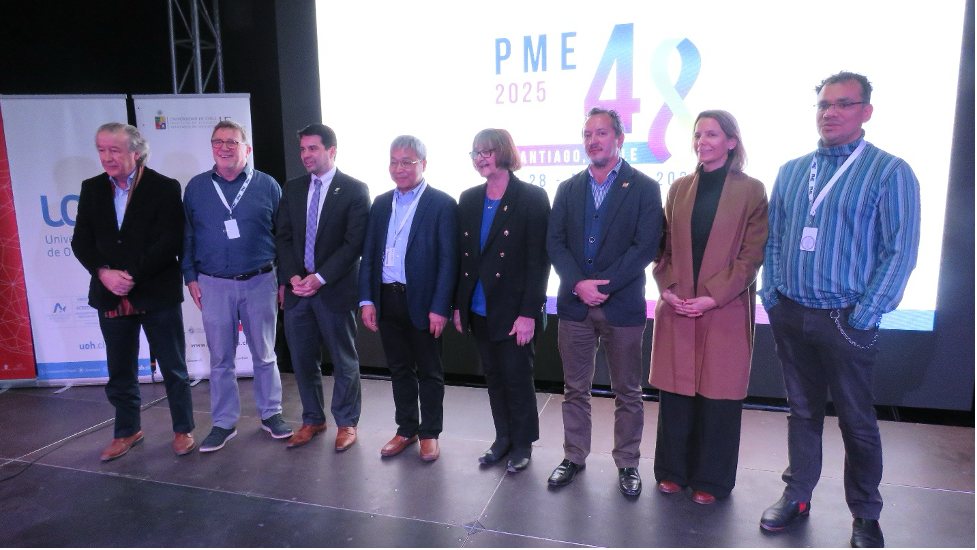
Hosted by the Faculty of Physical and Mathematical Sciences of Universidad de Chile, about 340 participants from more than 40 different countries joined PME 48. The most numerous delegations came from Germany, the United States, and Chile. The conference theme, “Making sure that mathematics education research reaches the classroom,” reflected the profound need of the Latin American region to use every means possible to support mathematics education. Four plenary lecturers, Jinfa Cai (USA), Soledad Estrella (Chile), Judy Anderson (Australia), and Wim Van Dooren (Belgium), shared invaluable experiences and reflections about how mathematics education research may impact classrooms, sometimes directly via classroom research or lesson study, and other times indirectly via the study of principles and ideas leading to better teaching methods or materials.
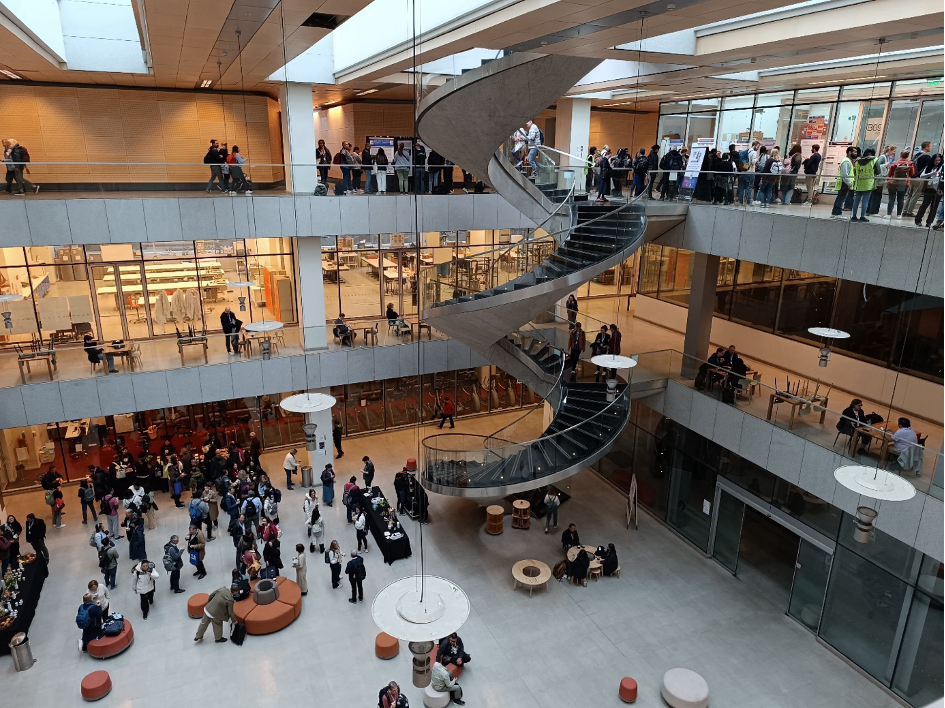 Throughout the week, participants were able to present and discuss their research and share experiences, thoughts, and ideas for the future. We are glad that the PME community decided to travel all the way to the southwestern corner of America, enhancing the visibility and impact of local researchers and research programs and promoting exchange between teams from different countries and contexts. We thank all researchers, reviewers, and members of the Local Organizing Committee and the International Program Committee who helped in making PME 48 an event of the highest scientific quality in the field. PME 48 was made possible by the generous support of the Center for Advanced Research in Education and the Center for Mathematical Modeling, both based at Universidad de Chile, and of Universidad de O’Higgins. Additionally, the organizational support provided by the Foundation for Mathematical Modeling was essential for providing all participants with a great scientific and social experience. The conference was also supported by the Chilean Mathematical Society and the Chilean Society for Mathematics Education.
Throughout the week, participants were able to present and discuss their research and share experiences, thoughts, and ideas for the future. We are glad that the PME community decided to travel all the way to the southwestern corner of America, enhancing the visibility and impact of local researchers and research programs and promoting exchange between teams from different countries and contexts. We thank all researchers, reviewers, and members of the Local Organizing Committee and the International Program Committee who helped in making PME 48 an event of the highest scientific quality in the field. PME 48 was made possible by the generous support of the Center for Advanced Research in Education and the Center for Mathematical Modeling, both based at Universidad de Chile, and of Universidad de O’Higgins. Additionally, the organizational support provided by the Foundation for Mathematical Modeling was essential for providing all participants with a great scientific and social experience. The conference was also supported by the Chilean Mathematical Society and the Chilean Society for Mathematics Education.
We hope that we won’t have to wait another 15 years for PME to come again to Latin America. To ensure that mathematics education research reaches the classroom, we need contributions and perspectives from all over the world.
WFNMC congress invitation
WFNMC congress invitation
The World Federation of Mathematics Competitions invites you to participate in its 10th Congress. Here are the most important details:
Dates: July 22-28, 2026
Place: Putrajaya, Malaysia (travel via Kuala Lumpur)
Website: https://wfnmc2026.com/
Pre-registration: https://tinyurl.com/wfnmc2026
Contact:
We urge you to mark the date on your calendars. Anyone pre-registering will be kept up to date on all organizational developments.
I look forward to seeing you in Malaysia!
Robert Geretschläger, President of WFNMC
News from ICMI Country Representatives
News from Chile
News from Chile – Chile Celebrates Mathematics Day 2025 Honoring Ramón Picarte
Leslie Jiménez, Paola Comparin, Mauricio Godoy, and Mariela Carvacho Bustamante
From June 9 - 13, Chile once again celebrated the Día de las Matemáticas en Chile, a week dedicated to showcasing how mathematics is taught, researched, shared, and lived across the country. The commemoration, promoted by the Chilean Mathematics Outreach Network (DIMAT), pays tribute to the birth of Ramón Picarte Mujica (June 9th, 1830 – March 7th, 1894), recognized as the first proper Chilean mathematician and scientist. There were other important scientists born in Chile before Picarte, but most of their work was done abroad.
 Picarte made contributions to mathematics through his innovative calculation tables, which were, at that time, one of the most used mathematical tools for many purposes such as agriculture, navigation, and prices. He introduced tables that improved existing ones and that were able to reach a higher level of accuracy. His tables were presented at the prestigious Academy of Sciences in Paris in 1859. Picarte is remembered not only for his mathematical achievement but also for his strong social commitment: He championed cooperative societies, mutual aid initiatives, and community savings banks in Chile during the 19th century. His legacy continues to inspire today’s academic and civic communities.
Picarte made contributions to mathematics through his innovative calculation tables, which were, at that time, one of the most used mathematical tools for many purposes such as agriculture, navigation, and prices. He introduced tables that improved existing ones and that were able to reach a higher level of accuracy. His tables were presented at the prestigious Academy of Sciences in Paris in 1859. Picarte is remembered not only for his mathematical achievement but also for his strong social commitment: He championed cooperative societies, mutual aid initiatives, and community savings banks in Chile during the 19th century. His legacy continues to inspire today’s academic and civic communities.
Throughout this week, universities, schools, and local organizations carried out a wide range of activities to highlight the role of mathematics in society.
The initiative spread across digital platforms using the hashtags #DíaDeLasMatemáticasChile, #diadelasmatematicaschile, #RamónPicarte, #ramonpicarte #MatemáticasParaChile, #matemáticasparachile, #díadelasmatemáticascl, and #DíaDeLasMatemáticasCL. The aim was to invite citizens to take part in conversations, workshops, and outreach activities. There are many instances in Chile throughout the year in which mathematicians connect with educational communities (one of the most important appeared in an earlier edition of this Newsletter), but this special celebration is intended to reach society at large.
At the national level, the celebration was widely shared on social media. Throughout the week, students, teachers, and institutions shared posts, photos, and videos under the official hashtags, highlighting their own activities and reflections on the importance of mathematics in daily life. This online participation expanded the visibility of the initiative and reinforced the sense of community around the celebration.
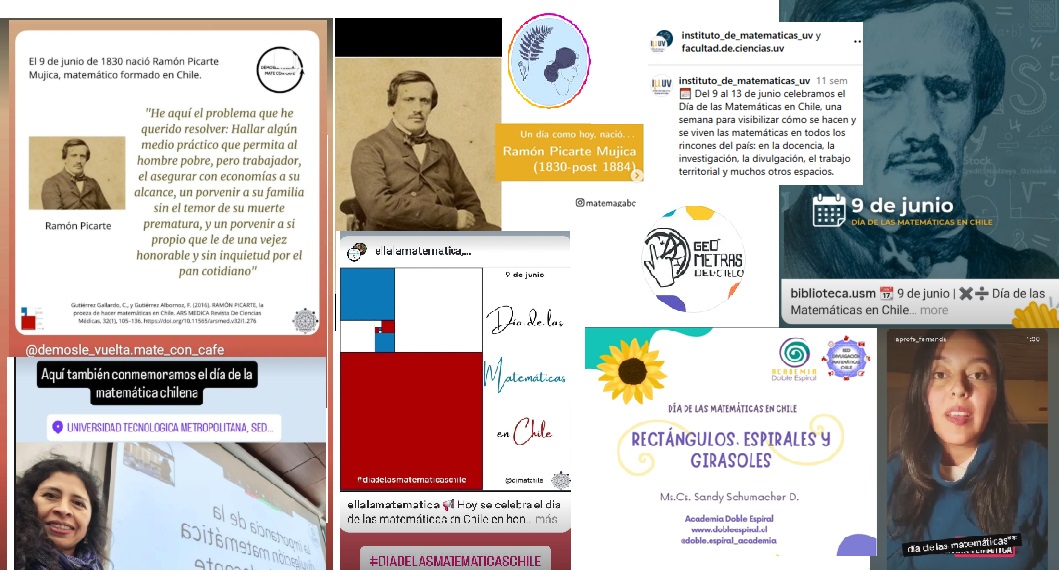 This year’s Mathematics Day reaffirmed that, much like Ramón Picarte envisioned in his time, mathematics continues to be a powerful tool not only for scientific progress but also for social transformation in Chile.
This year’s Mathematics Day reaffirmed that, much like Ramón Picarte envisioned in his time, mathematics continues to be a powerful tool not only for scientific progress but also for social transformation in Chile.
An in-depth discussion of Picarte’s historical importance (in Spanish), including a translation of the 1859 official minute of the Academy of Sciences mentioning Picarte’s work, can be found in Gutiérrez Gallardo, C., & Gutiérrez Albornoz, F. (2016). RAMÓN PICARTE, la proeza de hacer matemáticas en Chile. ARS MEDICA Revista De Ciencias Médicas, 32(1), 105–136. https://doi.org/10.11565/arsmed.v32i1.276.
News from France
News from France - Report on the Conference in honor of Guy Brousseau
Stéphane Vinatier, ICMI Country Representative, president of the CFEM (Commission Française de l’Enseignement Mathématique)

During July 7-10, 2025, a conference was held at the University of Bordeaux (France) to pay tribute to Guy Brousseau, the first ICMI Klein’s award recipient,[1] and to the influence of his pioneering work.[2] We were welcomed in the beautiful building of the Campus Victoire in Bordeaux (France).
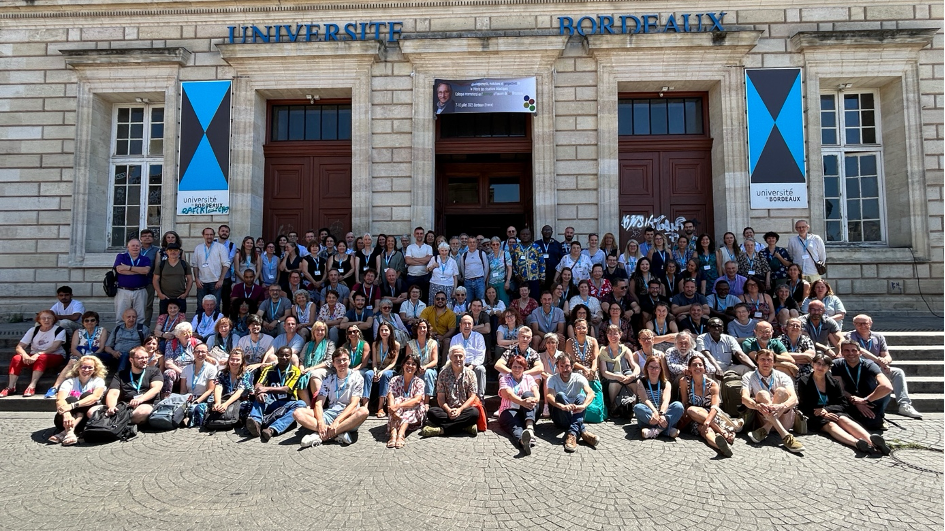 Group photo in front of the building of the conference (credit Gregory Train– 2025)
Group photo in front of the building of the conference (credit Gregory Train– 2025)
The conference was multifaced: a place for memory locally, in France and worldwide; a place to highlight the role of the theory of didactic situations in current research in didactics of mathematics (TDS); and a place to share and reflect on the role of TDS in teaching and teacher training. A planisphere with video contributions of Brousseau’s doctoral students outside of France was developed prior the conference.[3]
Four themes were addressed during the conference across plenary conferences, panels, parallel communications, and workshops:[4] Theme 1 - From the mathematization process to the theory of didactic situations: COREM, a methodological and epistemological instrument for the theory of didactical situations; Theme 2 - The Theory of Didactical Situations in current research: developments and live questions; Theme 3 - Didactical Situation Theory and the professional development of teachers; Theme 4 - The international influence of Guy Brousseau’s work.
The conference gathered around 200 participants, among them 30 invited speakers and, following the call for contribution, more than 50 contributors to the parallel sessions: nine workshops, 36 talks, and five posters.
The pre-proceedings of the conference are available at: https://hal.science/hal-05184913v1
The dynamic and the richness of the exchanges will be continued through various publications linked to the conference. First, all the invited speakers are invited to contribute to a special issue of the online international journal Recherches en Didactique des Mathématiques. Second, several journals specializing in mathematics education and the IREM network (Annales de Didactique et de Sciences Cognitives, EpiDEMES, Grand N, Petit x, Repères IREM), in consultation with the conference’s scientific committee, have joined forces to issue a joint call for papers.
1 A unit is dedicated to his work in the frame of the AMOR project (https://www.mathunion.org/icmi/awards/amor/guy-brousseau-unit).
2 See the announcement in the ICMI Newsletter published on March 15, 2025.
3 https://view.genially.com/6818e5c57898ac34ca31a38b/interactive-content-theses-brousseau
4 For more information on the conference, please visit:https://guy-brousseau.sciencesconf.org/
News from Latvia
News from Latvia: Advancements in Primary Mathematics Education Amidst Digital Transformation
Marta Mikīte – ICMI Country Representative
 The Interdisciplinary Centre for Educational Innovation (SIIC), Faculty of Exact Sciences and Technologies, University of Latvia, has produced the open-access methodological edition Matemātikas metodika 1.–6. klasei, a methodological handbook for primary mathematics teachers (Grades 1–6) to support day-to-day teaching (research programme VPP-LETONIKA-2021/1-0010). Built on a content–process integration framework, the methodology treats digital technologies as a fourth vertex alongside learner, teacher, and curriculum and focuses on four areas: self-regulated learning (metacognition), rich mathematical communication with explicit transitions between representations, motivation/well-being, and purposeful use of digital tools. Part I outlines the framework, evidence from lesson observations and other overarching topics; Part II provides guidance and task types across number, relations, data, geometry, and measurement, with formative assessment prompts and lesson examples.
The Interdisciplinary Centre for Educational Innovation (SIIC), Faculty of Exact Sciences and Technologies, University of Latvia, has produced the open-access methodological edition Matemātikas metodika 1.–6. klasei, a methodological handbook for primary mathematics teachers (Grades 1–6) to support day-to-day teaching (research programme VPP-LETONIKA-2021/1-0010). Built on a content–process integration framework, the methodology treats digital technologies as a fourth vertex alongside learner, teacher, and curriculum and focuses on four areas: self-regulated learning (metacognition), rich mathematical communication with explicit transitions between representations, motivation/well-being, and purposeful use of digital tools. Part I outlines the framework, evidence from lesson observations and other overarching topics; Part II provides guidance and task types across number, relations, data, geometry, and measurement, with formative assessment prompts and lesson examples.
Open access (PDF) here.
Latvia’s Grade 4 pupils continue to perform above the international average in mathematics (TIMSS 2023), but affective measures—such as students’ confidence—are below average, keeping well-being and engagement firmly on the agenda. Recent national research led by the SIIC shows that across 60 observed primary lessons, digital tools were present but used sparingly and reproductively, and no fully blended lessons were seen; many lessons relied on low-demand tasks and recall-type talk. As a result, classroom practice is not yet where it needs to be, likely influenced by the generalist primary model where class teachers teach most subjects and may lack a strong grounding in subject-specific pedagogy for mathematics.
Methodology on its own brings little change. Sustained professional development (PD) helps teachers trust it and use it in daily practice. A PD model has been created and tested to support the implementation and build three capacities: self‑regulated learning, rich mathematical communication with deliberate representation transitions, and purposeful use of digital tools—the very areas flagged by classroom evidence. We use shared observation criteria and the study’s four teaching profiles to target support and track change alongside lesson examples and guidance. In addition, we introduced the methodology at the UL SIIC conference on Aug 21, 2025, which brought together 500+ participants—a launchpad for follow‑up PD workshops.
The book is a collaborative work by three mathematics education scholars—Ildze Čakāne and Ilze France (University of Latvia) and Astrīda Cīrule (Concordia University Chicago; University of Latvia)—who co‑authored the underpinning study. Contact: ildze.cakane@lu.lv, ilze.france@lu.lv, astrida.cirule@lu.lv. They welcome feedback and questions.
We aim to raise students’ mathematical competence and confidence nationally because the primary years lay the foundation: Learners construct core ideas, develop reasoning habits, and form lasting attitudes toward mathematics. Coupled with sustained, school‑based PD, the goal is to make high‑quality, low‑anxiety mathematics teaching the everyday norm.
News from the Philippines
News from the Philippines
Carlene PC Pilar-Arceo, ICMI Country Representative
MATHTED 2025: 15th Biennial and International Conference on Mathematics Education
The Philippine Council of Mathematics Teacher Educators (MATHTED), Inc., in partnership with the University of Santo Tomas (College of Science, College of Education, Senior High School, and Junior High School), will host its 15th Biennial and International Conference on Mathematics Education from October 16 to 18, 2025, at UST, Manila, Philippines. The theme of this conference, “Mathematics Education for Learning Futures: Towards the Fulfillment of the Sustainable Development Goals,” aims to bring together mathematics teacher educators, researchers, mathematics teachers, supervisors, and administrators from both public and private schools. The goal is to exchange insights, research findings, and best practices that enhance mathematics teaching and learning in the 21st century.
This MATHTED 2025 conference will feature plenary talks, workshops, parallel sessions, special interest groups (SIGs), and a panel discussion by local and international educators actively engaged in research on mathematics education. The plenary talks underscore mathematics education as a collaborative and innovative force that empowers learners, promotes responsible AI, and addresses global challenges. They also highlight problem solving, outdoor learning, and strategic directions aligned with the Philippines’ national goals for sustainable development. The workshops will showcase research-based classroom strategies and include hands-on activities and opportunities for active participation. Similarly, the oral and poster presentations will be grounded in research, focusing more broadly on mathematics teacher education and mathematics education. At the same time, SIGs are avenues to work on common interests in mathematics research areas.
Contributions in the form of theoretical papers, expository papers, and research studies addressing relevant issues will be organized around seven themes:
A.) Ethnomathematics;
B.) Social Justice and Mathematics Education;
C.) Problem Solving and Problem Posing;
D.) Curriculum Enactment;
E.) Assessment;
F.) Technology and Artificial Intelligence (AI);
G. General Interest.
Additionally, at UST, there will be a special MATHTED Early Career Researchers’ Day (M-ECRD) on October 15, 2025. This event will allow early-career researchers to enhance their research competencies, establish new connections and networks, and collaborate with internationally recognized scholars and experts in related fields.
MTAP-TL Math Count 2025: A Celebration of Mathematical Excellence at PLM
On June 28, 2025, the Mathematics Teachers Association of the Philippines–Tertiary Level (MTAP-TL) held the much-awaited Math Count 2025 at the Pamantasan ng Lungsod ng Maynila (PLM), uniting some of the country’s brightest mathematics students and educators for a full day of competition, inspiration, and collaboration. The historic PLM campus provided the perfect setting for an event that blended intellectual rigor with camaraderie as participants from across the Philippines converged to showcase their talent and passion for mathematics.
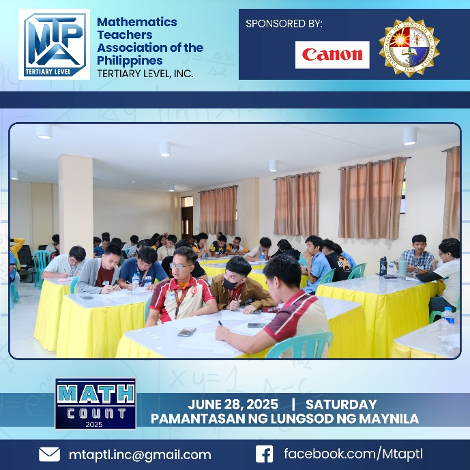
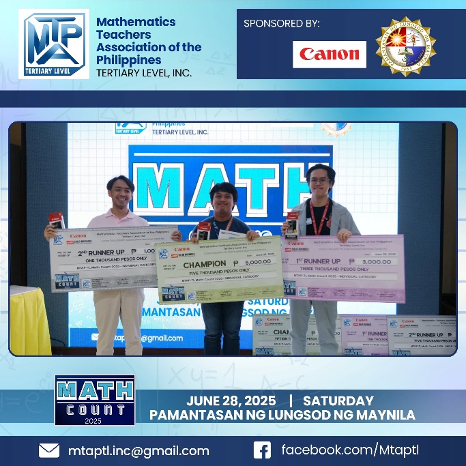
The day began with welcoming remarks that set an energetic and focused tone followed by an engaging plenary session led by Engr. Romeo Q. Tolentino, professor from National University – Manila, on “Novel Scientific Calculator-Based Implementations of Newton’s and the Secant Methods Using the Canon F-789SGA.” Supported by Canon Calculators PH, the session offered students, educators, and math enthusiasts a meaningful opportunity to explore real-world applications of numerical methods through technology, underscoring MTAP-TL’s commitment to merging innovation with mathematics education.
The competition unfolded in both individual and team rounds, presided over by a respected panel of judges composed of Mr. Percival Byron S. Bueser, Ms. Ada Edaleen A. Diansuy, and Engr. Normando Cervantes Jr., whose expertise ensured fairness and challenge. Participating schools included Pamantasan ng Lungsod ng Maynila, Rizal Technological University, Eulogio “Amang” Rodriguez Institute of Science and Technology – Manila Campus, City College of Calamba, Antipolo Institute of Technology, University of Luzon, Polytechnic University of the Philippines – Manila, De La Salle University, University of the Philippines Los Baños, Mandaluyong College of Science and Technology, Technological Institute of the Philippines – Quezon City, Mapúa University, Gordon College, and Camarines Norte State College.
In the Individual Category, Charles Dwight Pelaez of the University of the Philippines Los Baños claimed the championship and a ₱5,000 prize, followed by Justin Teng Soon Khoo of Mapúa University as first runner-up with ₱3,000 and Jan Joshua Cruz of De La Salle University as second runner-up with ₱1,000. In the Team Category, UPLB’s “Huling Sayaw” team composed of Pelaez, Kobe Bryant Mercado, and Jay Lord Ugaddan, under the guidance of Coach Mark Allien Roble, emerged as champions earning ₱15,000. De La Salle University’s team, coached by Charles Julius Oliquino and composed of Cruz, Jan Vincent Simbol, Dominic Navarro, and Maria Mariella Dumaya, secured first runner-up with ₱10,000, while Mapúa University Team 1, coached by Francis Anthony Llacuna and composed of Khoo, Derek Tyler Ong, and Yuan Miguel Rubio, placed second runner-up with ₱5,000. All winners also received a Canon F-789SGA Scientific Calculator and a Certificate of Recognition.
As the day concluded, applause and cheers filled the PLM halls not only for the victors but for every participant who brought their skill, dedication, and love for mathematics to the competition. Math Count 2025 stood as a testament to MTAP-TL’s mission of fostering mathematical excellence and innovation nationwide, setting the stage for an even more inspiring Math Count 2026.
News from Poland
News from Poland
Edyta Juskowiak, ICMI Country Representative
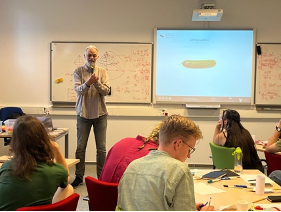 From July 18–27, 2025, the 28th edition of the international summer school Quality Class took place at the Faculty of Mathematics and Computer Science of Adam Mickiewicz University in Poznań. The event, dedicated to modern and innovative methods of teaching mathematics, gathered students, tutors, and experts from across Europe. It was organized by STA-International (Netherlands) and the University of Turin (Italy) in cooperation with partner institutions.
From July 18–27, 2025, the 28th edition of the international summer school Quality Class took place at the Faculty of Mathematics and Computer Science of Adam Mickiewicz University in Poznań. The event, dedicated to modern and innovative methods of teaching mathematics, gathered students, tutors, and experts from across Europe. It was organized by STA-International (Netherlands) and the University of Turin (Italy) in cooperation with partner institutions.
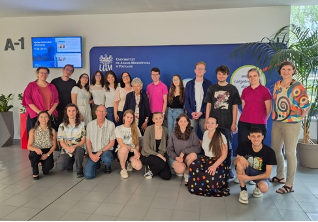
In total, 26 participants attended: 2 tutors; 16 students from Poland, the Czech Republic, Hungary, Italy, and the Netherlands; and 8 invited speakers. Tutors were Lambrecht Spijkerboer (STA-International, Netherlands) and Kalina Kijewska (University of Turin, Italy). Students represented universities in Poznań, Kraków, Wrocław, Turin, Prague, Eger, and Zwolle.
The student teams prepared workshops on diverse topics:
* Adam Mickiewicz University, Poznań, Poland – MathCityMap in mathematical education (mobile app for outdoor tasks).
* University of the National Education Commission, Kraków, Poland – How to conduct a review lesson on probability theory (interactive teaching methods).
* University of Wrocław, Poland – Playing with the problems (creative approaches to non-standard tasks).
* University of Turin, Italy – Artifacts in mathematics education (use of objects and teaching tools).
* Charles University, Prague, Czech Republic – The power of examples in the math classroom (impact of examples on understanding).
* Eszterházy Károly Catholic University, Eger, Hungary – Problem solving and logical thinking (developing analytical skills).
* Hogeschool Windesheim, Netherlands – Diagnostic questions in mathematics (identifying students’ difficulties).
Tutors also conducted a session on the teacher’s role in groupwork.
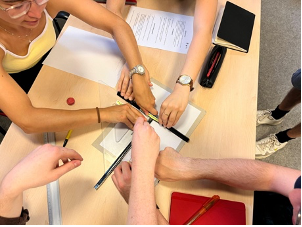 The program was enriched by expert lectures and workshops. Topics included: Pólya’s problem-solving method and open-ended tasks (Prof. UAM Edyta Juskowiak, Poland), learner-generated examples (Dr. Zoltán Kovács, Hungary), teacher prompts in problem solving (Dr. Eszter Kónya, Hungary), eye tracking and understanding graphs (Prof. UKEN Mirosława Sajka, Poland), mathematical experiments (Marcin Karpiński and Małgorzata Zambrowska, Poland), STEAM interdisciplinarity (Prof. Ornella Robutti, Italy), feedback and formative assessment (Dr. Eliza Jackowska-Boryc, Poland), and heuristic strategies for problem solving (Prof. Jarmila Novotná, Czech Republic).
The program was enriched by expert lectures and workshops. Topics included: Pólya’s problem-solving method and open-ended tasks (Prof. UAM Edyta Juskowiak, Poland), learner-generated examples (Dr. Zoltán Kovács, Hungary), teacher prompts in problem solving (Dr. Eszter Kónya, Hungary), eye tracking and understanding graphs (Prof. UKEN Mirosława Sajka, Poland), mathematical experiments (Marcin Karpiński and Małgorzata Zambrowska, Poland), STEAM interdisciplinarity (Prof. Ornella Robutti, Italy), feedback and formative assessment (Dr. Eliza Jackowska-Boryc, Poland), and heuristic strategies for problem solving (Prof. Jarmila Novotná, Czech Republic).
Quality Class 2025 proved to be a valuable event combining theory with practice. It fostered teaching competence, reflection, dialogue, and experimentation while strengthening the international network of young teachers and experts. Participants left with new ideas, inspirations, and motivation to pursue innovative mathematics education. Alongside the academic program, they enjoyed informal activities such as sightseeing in Poznań, sports, walks, and evening gatherings, which deepened relationships and laid solid foundations for further international cooperation.
News from South Africa
News from South Africa and the Association for Mathematics Education of South Africa (AMESA)
https://www.amesa.org.za/
Dr. VG Govender, ICMI Country Representative
AMESA Congress 2025
This year the 30th AMESA National Congress took place at the University of Limpopo just outside Polokwane in the Limpopo Province of South Africa from June 30 – July 4, 2025. The theme was “Envisioning Equitable Mathematics Education: Promoting Relevance and Engagement.” There were close to 1,500 delegates at the Congress, which comprised 6 plenary papers, 34 long papers, 5 short papers, 14 “how I teach” sessions, 24 workshops, and 20 Math Market sessions. There were also evening activities in the form of social functions and an afternoon excursion on July 2, 2025. The parallel sessions consisted of 6 follow-up discussions with plenary speakers, 26 long papers, 6 short papers, 10 workshops, and 20 Mathematics markets.
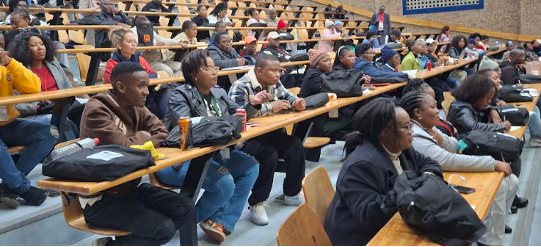
Delegates in a parallel session at the AMESA Congress
Mega Maths Conference 2025
The Mega Maths Conference (festival) took place at the University of the Western Cape in South Africa from July 7 – 11, 2025. This festival was attended by academics, teachers, government officials, private sector employees, school pupils, and other organizations involved in mathematics. More than 500 delegates attended the festival which consisted of key plenary sessions focused on AI (as applied within a mathematics context), the importance of mathematics in career choices, teacher training, Mathematics Olympiads, and a host of other parallel sessions which included workshops, teacher courses, and other key activities associated with mathematics/mathematics education.
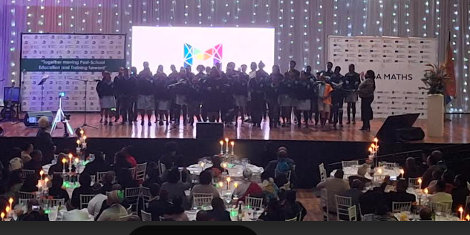
Opening ceremony: Mega Maths
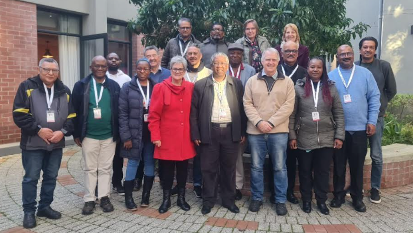
Primary Teacher Education committee
South African Mathematics Olympiad (SAMO)
The third round of the South African Mathematics Olympiad took place at the end of July 2025. There were 218 learners from 107 schools who qualified for the 3rd Round (a competition for primary school learners that will take place on September 11, 2025).
News from USA
News from USA - A request for your assistance from the U.S. National Academies’ Board on International Scientific Organizations
The U.S. National Academies’ Board on International Scientific Organizations (BISO) is conducting an online survey to assess the experiences of national and international experts such as schoolteachers, curriculum developers, and educational experts in integrating data science, computational thinking, and AI into the K-12 curriculum.
As a valued expert, you can help us with this important project. We welcome your participation and will keep your responses anonymous. We will only publish aggregated or summarized results and will destroy individual responses after the analysis is completed. The survey link is https://survey.alchemer.com/s3/8393839/Survey-to-Assess-International-Practices-in-K-12-Mathematics-Education-and-the-Role-of-Computational-Thinking-Data-Science-and-AI.
Your response is most welcome by September 30, 2025.
International scientific exchange of teachers and educators is crucial to the advancement of today’s global challenges. BISO will hold an international workshop in Washington, DC, in January 2026 where world experts will describe in detail how they are modernizing their mathematics curriculum and integrating data science, AI, and computational thinking. BISO will publish a proceeding of the workshop.
The results of this survey will enable BISO to get a global picture of K-12 data science, computational thinking, and AI education. The experiences and views collected through this survey can help shape discussions at the workshop about the impact of these global efforts and identify the most successful practices.
Please feel free to forward this invitation to other experts within your professional networks and social media. We would like to hear from educators, curriculum designers, and K-12 mathematics education professionals around the world who have experience on this topic.
BISO is a unit of the National Academies, a non-governmental organization with no control over education policies or processes. Thank you for your willingness to respond to this survey and to forward the survey link to others in your network. Please let me know if you have questions or additional information about this request.
Kind regards,
Ana Ferreras Fiel, BISO Staff Officer
Padhu Seshaiyer, BISO Chair
Conferences to come
IV Congreso de Educación Matemática de América Central y El Caribe (IV CEMACYC)
Dates: November 2-7, 2025
Location: Santo Domingo, Domenican Republic
More information on the website.
The Implementation and Replication Studies in Mathematics Education Conference (IRMEC)
Dates: November 3-7, 2025
Location: Mexico City, Mexico
More information on the website.
African Association for Mathematics Didactic (ADiMA) 5th ADiMA Conference (ADiMA-5)
Dates: December 14–18, 2026
Location: Niamey, Niger
website to be established
World Federation of National Mathematics Competitions - WFNMC-10
Dates: July 22-28, 2026
Location: Putrajaya, Malaysia
More information on the website.
Pre-registration
ICME-16
Dates: July 9-16, 2028
Location: Prague, CZ
More information on the website.